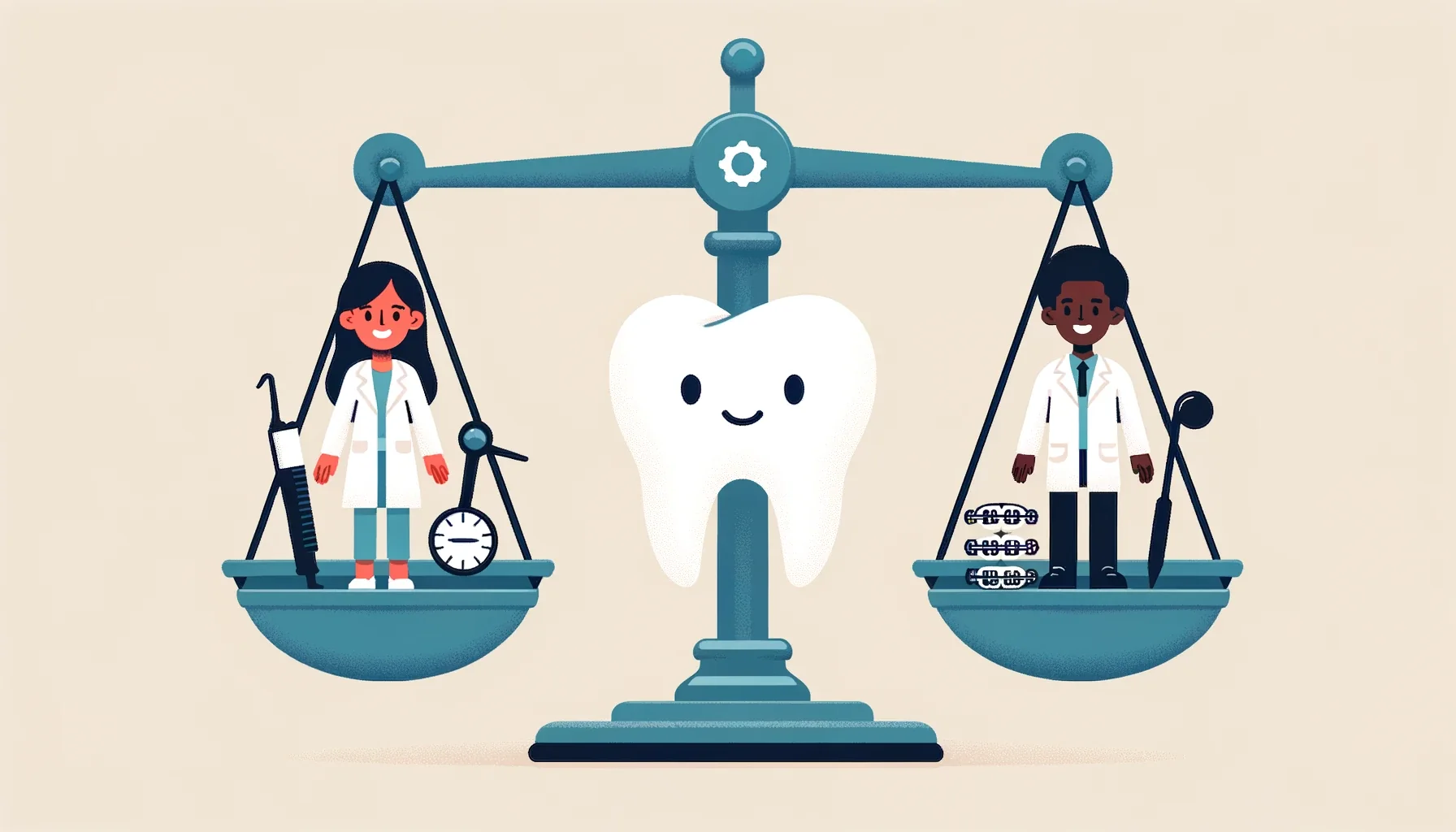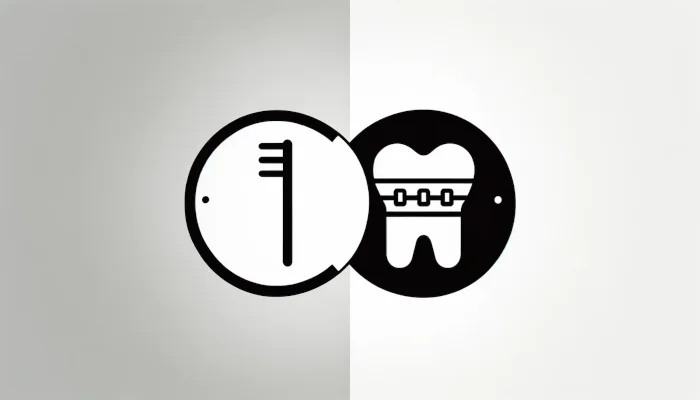Dentist or Orthodontist: Who should you choose?

Deciding between an orthodontist or a dentist for orthodontic treatment is a decision of great importance that deserves careful consideration. A clear understanding of both professions and their respective roles in oral health is essential. 1
This comprehensive guide aims to provide you with a detailed overview of the significant differences between the two roles, highlighting their specific qualifications as well as their unique expertise. By fully understanding the distinctive characteristics of these dental health professionals, you’ll be able to make an informed decision about your orthodontic treatment, which will have a significant impact on your long-term oral health.
Understanding the role of an orthodontist
Orthodontists are dental specialists who focus on the diagnosis and treatment of malpositioned teeth and jaws. They take additional years of specialized training after completing their dental studies. They have extensive knowledge and skills in straightening teeth, correcting bites and achieving optimal alignment. Their specialized skills enable them to treat a wide range of orthodontic problems, including crowded teeth, overbites, underbites, crossbites, and many others.2
The main responsibilities of an orthodontist
- Diagnosis and treatment planning: Diagnosis and treatment planning are central to orthodontics. Because of their specialized training, orthodontists have invaluable expertise in assessing dental and facial irregularities, including malocclusions. Their role is to carry out thorough examinations to determine the nature and severity of each patient’s orthodontic problems. These oral health professionals have the ability to design highly personalized treatment plans, taking into account the unique needs of each individual. They draw on their in-depth knowledge of oral and facial anatomy and the use of state-of-the-art technologies to develop treatment strategies aimed at achieving optimal results. Thanks to their expertise, they play an essential role in creating healthy, harmonious smiles for their patients, contributing to a better quality of life and increased confidence.
- Braces and corrective appliances: Orthodontists have unrivalled expertise in the field of braces and corrective appliances. Their extensive knowledge of the field enables them to recommend and install a diverse range of braces, tailored to the specific needs of each patient. These include traditional braces, which have proven their worth over the years by effectively correcting malocclusions and dental problems. In addition, they are skilled in the use of innovations such as transparent aligners, like Invisalign, which offer a discreet and comfortable approach to aligning teeth. In addition to the commonly known devices, they also have the expertise to recommend and supervise the use of special devices such as palate breakers and orthodontic helmets, which are essential for more complex orthodontic cases. Their role is not only to recommend these devices, but also to adjust them and monitor their effectiveness throughout the treatment. This diversity in orthodontic treatment options enables orthodontists to customize each treatment plan to meet the individual needs of their patients, guaranteeing optimal results and total satisfaction.
- Monitoring facial growth: Monitoring facial growth is an essential part of the orthodontist’s role, especially when treating children. These oral health professionals have a crucial responsibility in carefully observing the evolution of facial growth and jaw development. This early vigilance is designed to ensure optimal tooth alignment and to treat any potential problems at an early stage. In children, facial growth and jaw development are constantly evolving processes, and they are specially trained to detect the early signs of malocclusions or facial imbalances. By identifying these potential problems early on, they are able to implement early interventions, if necessary, to guide growth and development appropriately. This proactive approach can often prevent more serious problems in the future and reduce the complexity of subsequent orthodontic treatment. As such, they play an invaluable role in promoting children’s oral health, ensuring that their facial growth proceeds harmoniously and contributes to a healthy, aesthetically pleasing smile.
- Surgical interventions: In some cases, orthodontists may collaborate with oral and maxillofacial surgeons to perform corrective jaw surgery to improve alignment and enhance overall facial function and aesthetics.
- Importance of early intervention: Early intervention can often prevent or mitigate future problems. It allows potential problems to be identified and dealt with before they escalate, saving time and resources in the long term.
The role of a dentist in orthodontic treatment
Dentists play an essential role in providing a wide range of oral health care services. Their expertise encompasses preventive care, general dentistry procedures and the treatment of various dental conditions. They play an indispensable role in preserving the overall oral health of their patients. Among their skills, they are able to effectively treat common dental problems such as tooth decay, gum disease, and oral infections, ensuring the oral well-being of their patients.

However, it’s important to note that while dentists can manage a wide range of dental problems, their level of expertise in orthodontics may be less specialized than that of orthodontists. Orthodontists have dedicated themselves to advanced training specifically focused on dental and facial alignment disorders. Their in-depth knowledge and specialized training make them uniquely qualified to handle complex orthodontic cases and design highly personalized orthodontic treatment plans. So, depending on your specific needs, you may need to consult an orthodontist for specialized orthodontic treatment.
Dentists offer the following services:

- Routine dental examinations and cleanings: Dentists perform regular oral examinations, during which they carefully examine the condition of their patients’ mouths, teeth and gums. These consultations also include professional cleanings to remove plaque and tartar. X-rays can be taken to identify hidden problems. The main aim of these examinations is to monitor oral health, detect early signs of dental problems and provide preventive care advice.
- Restorative dentistry: Dentists are qualified to restore damaged or decayed teeth. They use a variety of procedures, including fillings to fill cavities, crowns to protect severely damaged teeth, bridges to replace missing teeth, and root canal treatments to save teeth with deep decay. This branch of dentistry aims to restore the function and integrity of teeth.
- Cosmetic dentistry: In addition to restoring dental health, dentists can also improve the appearance of their patients’ smiles through cosmetic dentistry procedures. This can include teeth whitening to lighten unwanted shades, dental veneers to correct minor defects, and dental bonding to repair imperfections. These procedures aim to restore patients’ confidence by creating aesthetically appealing smiles.
- General oral health care: Dentists play a vital role in educating their patients about proper oral hygiene practices, including brushing and flossing. They provide personalized advice on maintaining optimal oral health. In addition, they treat common dental problems such as tooth decay, gum disease, oral infections, and many more.
It’s important to note that, while some general dentists may provide orthodontic treatment, their orthodontic expertise may be limited. Dentists who provide orthodontic services usually acquire additional training through seminars or workshops, but this may not be as comprehensive as the specialized training and education that orthodontists receive.
Choosing the right professional for your orthodontic treatment
It’s important to choose the right professional for your specific orthodontic treatment needs. While general dentists may offer some orthodontic services, consulting an orthodontist can offer several advantages.

Expertise and specialization
Orthodontists devote their careers to the field of orthodontics, focusing solely on the diagnosis and treatment of orthodontic problems. Their specialized expertise ensures that they stay up to date with the latest advances in orthodontic technology and techniques. When choosing an orthodontist, you can trust their ability to provide personalized treatment plans tailored to your unique circumstances.
Comprehensive assessment and treatment
Orthodontists have a deep understanding of how teeth, jaws and facial structures interact. They perform comprehensive assessments, including X-rays, digital scans and clinical examinations, to accurately evaluate your orthodontic needs. Based on this assessment, they develop personalized treatment plans that address your specific concerns and goals, providing solutions for both bite alignment and overall aesthetics.
Extended processing options
Orthodontists provide a comprehensive array of treatment options designed to cater to the diverse needs of their patients. When it comes to orthodontic care, there is no one-size-fits-all solution. Instead, orthodontists specialize in tailoring treatments to address specific dental and orthodontic issues, ensuring each patient receives the most appropriate care for their unique circumstances.
Traditional Braces: Traditional braces remain a reliable and effective option for achieving straighter teeth and correcting bite issues. Orthodontists have perfected the art of applying and adjusting traditional braces over the years. These braces consist of metal brackets and wires, and while they may not be as inconspicuous as some other options, they excel at tackling complex orthodontic challenges.
Clear Aligners like Invisalign: In recent years, clear aligner therapy, exemplified by Invisalign, has gained immense popularity. These transparent, removable aligners offer a discreet and comfortable way to straighten teeth. Orthodontists are well-versed in this technology, using advanced software to plan and monitor your treatment. They can guide you through the process, ensuring that your clear aligners are custom-made to fit your teeth and progressively shift them into the desired alignment.
Other Orthodontic Appliances: Orthodontists are equipped to recommend and provide various specialized orthodontic appliances beyond braces and aligners. These may include palatal expanders, headgear, or functional appliances, each designed to address specific issues, such as jaw discrepancies or bite problems. Orthodontists possess the knowledge and experience to determine which of these appliances, if any, are necessary to achieve optimal results.
Technological advances in treatment
Recent technological advances have profoundly transformed the treatment options available in orthodontics, bringing significant benefits to patients. These advances have not only revolutionized orthodontic procedures, they have also made treatment more effective, considerably less invasive and significantly more comfortable for those requiring orthodontic care. This technological revolution has enabled orthodontic professionals to better personalize treatments, achieve more precise results, and reduce the discomfort associated with traditional braces. As a result, patients enjoy faster treatment, less discomfort, and a better overall experience during their orthodontic journey.
Long-term follow-up and support
Orthodontic treatment is a journey that often extends over a period of time, and it requires consistent care and follow-up to ensure that the results achieved are not only optimal but also sustainable in the long term. Orthodontists are dedicated to providing comprehensive long-term follow-up care to ensure the continued success of your treatment. Here’s a closer look at the key aspects of this ongoing support:
Periodic Adjustments: Orthodontic treatment typically involves the use of braces or aligners that require periodic adjustments. Orthodontists are well-versed in making these adjustments with precision to ensure that your teeth continue to progress towards their desired positions. These appointments are crucial for fine-tuning your treatment and addressing any changes or challenges that may arise along the way.
Regular Check-ups: In addition to adjustments, orthodontists schedule regular check-up appointments to monitor your progress and assess the overall health of your teeth and gums. These check-ups allow them to catch any potential issues early and make necessary adjustments to your treatment plan. It’s during these visits that orthodontists can address any concerns you may have and provide guidance on maintaining good oral hygiene throughout your treatment.
Maintenance of Braces: For those undergoing traditional orthodontic treatment with braces, orthodontists take on the responsibility of maintaining and ensuring the effectiveness of the braces. This includes addressing issues such as broken brackets or wires promptly to minimize disruptions in your treatment progress. They also educate patients on how to care for their braces to avoid common issues.
Addressing Concerns: Orthodontists understand that orthodontic treatment can raise questions and concerns. They are committed to providing a supportive environment where you can openly discuss any issues or discomfort you may be experiencing. Whether it’s adjusting to the feeling of braces, dealing with minor discomfort, or seeking advice on oral hygiene practices, orthodontists are there to address your concerns and offer solutions.
Monitoring Progress: The long-term success of orthodontic treatment hinges on closely monitoring progress. Orthodontists use various tools and technologies to track changes in the alignment of your teeth and bite. This ongoing assessment allows them to make informed decisions about the timing and nature of any adjustments needed to ensure that your treatment remains on track.
Ensuring Sustainability: Orthodontists not only focus on achieving immediate results but also on ensuring the sustainability of those results. They understand that maintaining proper alignment and oral health over the long term is essential. Therefore, they provide guidance on post-treatment retainers and oral care practices to help you maintain your beautiful smile well into the future.
Find an orthodontist
When it comes to choosing an orthodontist for your treatment, it’s essential to consider several factors that will ensure the success of your orthodontic journey. Here’s an in-depth look at the key elements to consider:

- Experience and expertise: The orthodontist’s experience and expertise are fundamental elements to evaluate. You should look for a professional who has extensive experience in treating a wide range of orthodontic conditions. Testimonials and reviews from previous patients can be invaluable in assessing their expertise and patient satisfaction. The more cases the orthodontist has treated, the better he or she will be able to understand and resolve your unique orthodontic situation.
- Technology and treatment options: Find out about the technological resources available in the orthodontist’s office. Technological advances in orthodontics are numerous and can considerably improve the precision, efficiency and comfort of your treatment. Make sure your orthodontist has access to the latest technology and most advanced treatment options to provide you with the best possible experience.
- Personalized approach: Personalizing your orthodontic treatment is essential. Look for an orthodontist who takes the time to understand your personal goals, concerns and expectations. A personalized approach ensures that your treatment plan is tailored to your unique needs, increasing the chances of achieving the best possible results. An orthodontist who takes your individuality into account will create a treatment plan tailored to your needs.
- Communication and patient care: Effective communication and a caring attitude are crucial to a positive orthodontic treatment experience. Look for an orthodontist who actively listens to your questions and concerns, and provides clear explanations every step of the way. A professional who prioritizes your comfort and well-being throughout the treatment will greatly contribute to your overall satisfaction.
- Payment plans and insurance: Understanding the financial aspects of your treatment is just as important. Learn more about the costs associated with orthodontic treatment and explore your options. Some firms offer flexible payment plans to ease the financial burden. It’s also a good idea to check the insurance coverage available to maximize the coverage of your orthodontic expenses.
By taking these factors into account and conducting a thorough search, you can find an orthodontist who matches your needs and offers exceptional orthodontic care.
Costs and insurance
When considering orthodontic treatment, it’s essential to consider the associated costs and understand your insurance options. Orthodontic treatment costs may vary depending on the complexity of your case, the type of appliances used and the length of treatment. Before committing yourself, ask your orthodontist for a detailed cost estimate.

It’s also important to check your dental insurance coverage. Some insurance policies offer partial or full coverage of orthodontic costs, depending on the nature of your plan. Contact your insurer for details of your coverage, and make sure you understand the steps involved in obtaining reimbursement for your orthodontic expenses.
Don’t forget to discuss payment options with your orthodontist. Many practices offer flexible financing plans to spread treatment costs over a longer period, which can make it easier to manage the finances of your orthodontic treatment.
By considering costs and insurance options, you can plan your orthodontic treatment with confidence, avoiding financial surprises and making informed choices for your oral health.
Conclusion
Choosing between an orthodontist and a dentist for your orthodontic treatment depends on the complexity of your case and your desired results. While dentists play a vital role in maintaining overall oral health, orthodontists bring specialized orthodontic expertise, ensuring accurate diagnosis, personalized treatment plans and comprehensive care throughout your treatment journey. Take the time to understand the qualifications, experience and expertise of both professionals to make an informed decision. Also read The 6 Essential Steps for Your Invisalign Treatment in Luxembourg
